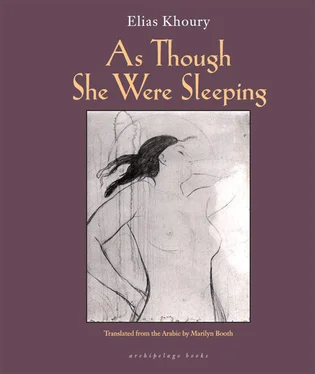Enough! said Hasiba. I’m not living for a single minute in this house of sin. But which of the two sins was she talking about? A husband striking up a relationship with a woman whose life was not exactly suspicion-free, or a father attempting to kill his son, precisely here in front of this house of sin, when he threw the rock and came into his lover’s chamber puffed up with pride?
What Hasiba did know was that she had returned to the state of a virgin exactly as she had been before giving birth to her only child, Yusuf. She hid behind her long black gown where the closed buttons down the front testified to her closed body. She was an unusually tall woman and her body was beautifully slender. Her striking eyes bulged slightly and her large nose commanded her face. She carried a dignity not to be resisted, crafted by the silence in which she lived and the black color that cloaked her to the outside world. Her son claimed that she could see in the dark; her gleaming eyes, he said, could pierce the very thickest gloom. He entreated his wife to act kindly toward his mother, who, frail and broken, now faced her end. He enumerated the woman’s virtues and reprised her sufferings. See how the pain is carved into her face? he exclaimed to his wife. This was her whole life, pain on top of pain. Be kind, Saadeh, please be kind!
But the stink! she would snap. Your mama won’t use a pot to do her business, and if she does, she doesn’t do anything there. The minute we go to bed the smell gets so bad I can’t bear it. Lord, what did I do to You to deserve this?
The odor of which Saadeh complained was the last thing one would have expected from a woman like Hasiba, who seemed evanescent with soap and exuded perfumes. Hasiba made her own scents. She steeped damask rose blossoms in water and blended them with jasmine and sweet basil. From this concoction she made the preparation she used to wash her face. Its fragrance would spill across the room to cascade over everyone. She was a woman enclosed in black garments who gave off nothing but perfumed scents, who behaved like a silent phantom and, when she moved among people, evoked sentiments of astonishment and fear. Even so, her husband’s behavior was enough to expose her to ridicule and disorder, and it passed on to her progeny when Salim bought the house after the death of Maryam the Egyptian. Milia knew the story because her mother recounted it to her, and her mother knew it from Yusuf her husband, and Yusuf knew it from the rock that had struck him in his right eye.
Why did Yusuf not say anything when his father bought the house? When Salim arrived to announce that he had purchased the house, Hasiba remained silent. The joy she had anticipated when the decision was made to move from the two small rooms with a toilet in the outer courtyard into a true house never arrived. Her husband summoned her to see the new house but she refused. He asked for her advice on buying suitable furnishings and she said it didn’t matter what he got. She spent her time making certain their belongings were secured and preparing to move. Everything happened in a perfectly ordinary way. The family moved into the new home. Husband and wife established themselves in the liwan overlooking the spacious central room while Yusuf’s mattress was placed in an out-of-the-way nook in the dar . Everything went very smoothly and naturally until she learned of it — and when she did, Hasiba exploded. Now all the silences that had been shut inside her closely done-up black garments spurted out and she poured her anger out and fully onto the head of her son, Yusuf. She would not forgive him for having hidden the house’s secret from her. How she learned of it and who told her were not issues of particular importance. No secrets are truly concealed, Saadeh said to her daughter. Everyone knew about Salim except his wife, and I didn’t really believe that she didn’t know. I think she knew from the beginning but acted as though she didn’t have a clue. But I wonder what took her over the edge? And anyway, what frightened her so much? Men! From the moment he picked up the disease, it was all over, but when she discovered that the house had been the Egyptian woman’s home, and that the bed had been hers, she began wailing and screaming and insisting she wanted to die. She poured kerosene over her robe and tried to light it. Yusuf threw himself on her burning body. He saved her and God kept the matter veiled from others.
But what happened to Salim after he found out he was impotent? That is the question for which there is no straightforward answer. He ate bricks of pure dirt and mud, as Maryam the Egyptian always said. He consulted every doctor he could find but without any luck. When his feet led him where they led him, though, the problem was resolved so perfectly and easily that it might as well never have existed. Khawaja Sergios Efthymios ordered an almond-wood bed frame from his workshop. Salim crafted it and delivered it to the house in person, with the help of his son, Yusuf. There he saw her; and his world became bright. The man had been living in total misery. Every night a desire he could not speak engulfed him but the moment he approached his wife, who was shrouded in the inevitable long nightgown, he was a block of ice. But now, standing before this short, deliciously plump and dark-skinned woman of forty or so, he felt simply and clearly that he was a man and that was more than enough. He made up the bed in the liwan , acknowledging the woman’s presence with a nod. He had gripped his son’s hand, ready to leave, when he heard her lilting Egyptian dialect and felt a tremor through his spine.
We’d like to try out the bed, M’allim, please don’t rush off! She sat down on the bed, leaned back as if to stretch out fully, and — Allah! — proclaimed it wonderful. She arose to thank him with a handshake. She squeezed his large rough hand, he was certain of that; and he would claim that he heard her say, Let us see you, M’allim. He got the message. He would indeed return, he decided; she would see him again.
Much later, when he told her he had fathomed what she was letting him know with her hand and her words, she nearly collapsed laughing. No, she said, she had not said anything like that; he had made up the story; nothing like that had even occurred to her.
No. . and in fact Milia invented this dialogue out of pure thin air. After all, no one knew, not even Yusuf, how it all had happened. Milia said she had dreamed of her grandfather running and skipping among grassy hillocks. He had become another man, she said, at least in her dreams. The fresh vigor of youth had come back; the old fierce grandpa they had known once had returned and his laugh rang out as it once had, no longer kept silent by the suffering he had endured. Apparently the man promised marriage to the Egyptian woman. Word was bandied about, even, that he considered embracing Islam, but the hand of God alone saved his wife from such an outrage. The Egyptian woman died suddenly and between a day and a night all that remained of the story was the house over which she would cast her shadow until Hasiba’s death.
When he broached the subject of marriage she said no, but she strung him along fleetingly with the teasing way she had. She could not help feeling ever so slightly, ever so dizzily, happy with the idea. It was the first time ever that Maryam had heard such a proposal addressed to her. Khawaja Efthymios had treated her strictly as a mistress. He had picked her out, taken her off the street, and made her into a lady. He had built this fine house among the trees just for her. He visited once a month. But he never proposed marriage, and in any case it would never have occurred to her that he might do so. He was seventy-five years old. On the first Wednesday of every month he came to her, paid her what had somehow been agreed on as her monthly salary, and reminisced with her about love in the past tense. And then he would leave. The man stayed loyal to this woman with whom he had fallen in love when she was twenty and had rescued from a likely future imposed by Ottoman law. The Ottoman Turks had grown fiercely interested in regulating and organizing those who professed prostitution by compelling women of error to live in a sealed-off quarter that would come to be named after the great Arab poet el-Mutanabbi. Efthymios took Maryam under his protective wing and treated her like the respected mistress of a man of the Beiruti aristocracy.
Читать дальше












